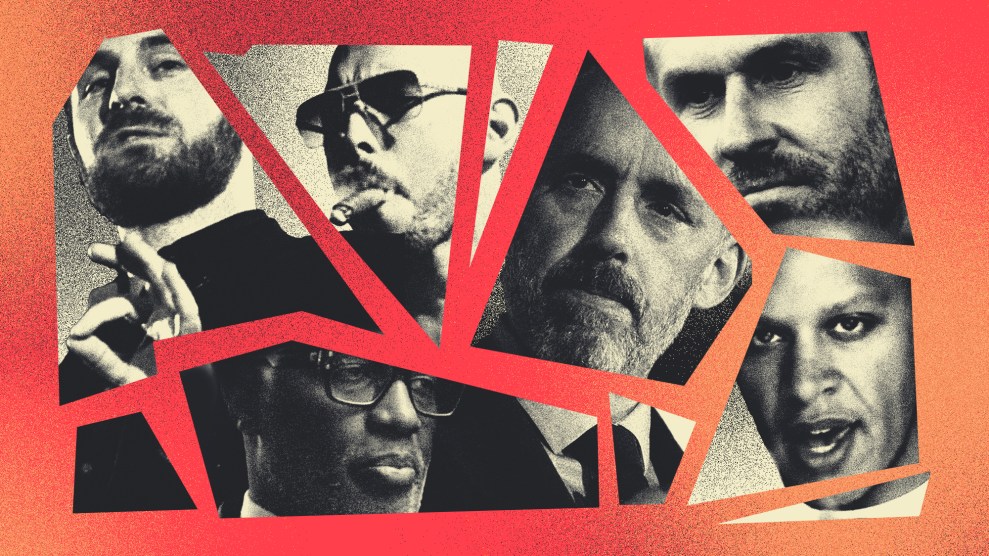Mark wanted to improve. The pandemic had sent him into an emotional tailspin. Covid coincided with his first heartbreak and an illness that left him bedridden. Even before calls to stay home, Mark rarely left his parents’ house in their small central European town: He spent most days playing video games and watching anime. The pandemic only drove him further inside himself. “It was honestly one of the toughest times of my life,” he told me. “I needed frequent therapy.”
As the world began to reopen in 2021, Mark—by then in his early 20s—wanted to dedicate himself to something better. He didn’t want to be this nerdy, wimpy kid anymore. He wanted a “blueprint,” he said, on how to be a man.
One day, he searched for “male advice” on YouTube. Before long, Mark was deep in the world of online masculinity gurus. He found Andrew Tate, a former professional kickboxer who carried himself like a mafia boss; Hamza Ahmed, whose focused, monklike demeanor Mark admired. A seemingly endless supply of similar guys emerged in his YouTube recommendations: Sneako, Fresh&Fit, Teaching Men’s Fashion, 1STMAN. Together they made up a loose, informal network called “the manosphere.” The group promised self-mastery: mental, physical, emotional, and financial.
A lot of their advice worked. They told Mark to stop “eating trash.” He swore off sugar and his acne cleared up. They told him to lift weights. Mark downloaded a home workout app on his phone; he got a gym membership. He saw his body change. They told him to learn to fight. Mark took jiu-jitsu and boxing classes. He felt new strength.
Mark gave up playing the latest RPG late into the night. Instead, he would meditate and write in his journal, like Hamza told him. Then he’d work on his ideas for an online business, like Tate told him. It felt like progress. The more he watched these men, the more he trusted them.
Amid the “harsh truths”—about himself, about the world, about others—Mark remembered an accompanying mental transformation that “completely changed my worldview.” As a matter of biology, the men told Mark, women were hypergamous: “females” were prone to “dating up.” They would not ever care about a loser. It was science. And it was just a cold hard fact that the only choice was to become the ideal: an alpha. He needed to be a high-value man. He needed to be chiseled, stoic, and disciplined. He needed to be a successful entrepreneur with a nine-figure company who took business trips to Dubai. Mark would start every day thinking about how he could increase his “SMV” (Sexual Market Value).
He picked up other beliefs from the manosphere, too. Dark forces in society were intentionally “making men weak.” Transgender people lived in a “delusion.” The fight for gay rights was “corrupting the minds of youth.” It could all be summed up in a catchphrase: “reject degeneracy, embrace masculinity.” All this talk about returning to old-fashioned gender roles made his friends worry about him. Sometimes people made fun of him, calling him an “incel.” But that only made Mark more confident. See? He told himself. No one is trying to help. No one understands. Wasn’t that the whole problem?
Like many resentful young men, Mark came to a concrete worldview: The advances of women in society had been a mistake. Their empowerment took something directly from him. In fact, women were at the root of his, and all men’s, problems.
That is how Mark recalls the experience of “taking the red pill,” a phrase borrowed from The Matrix films that implies a sudden mental awakening—a realization of how the world truly exists. It is now common internet jargon to describe right-wing radicalization, but it was popularized by the manosphere.
These days it’s difficult to find self-help for men that hasn’t been influenced in some way by reactionary ideas. Online, there are a slew of dudes who are in better physical shape, who appear to have more money, who seem more confident—and who are ready to sell you practical advice on weight-lifting amid a sexist rant. Tate and others market to a real crisis among men. But they offer a flimsy absolution, despite all the talk of grit: The problem with boys, the manosphere says, is actually just women.
“They promised that if I followed what they said I’d fix my life,” Mark remembered. “But I just felt lonely as fuck.”

Aggrieved men seeking to reclaim their dominance has been one of the defining political trends of the last decade. In 2014, Gamergate—a backlash against women in video games—politicized a new generation of internet misogynists. It propelled the alpha-male blogger turned MAGA digital soldier Mike Cernovich and propped up Milo Yiannopoulos, the former editor of Breitbart. In 2016, Donald Trump won the American presidency with the largest gender margin in the history of exit polling. His campaign manager at the time, Steve Bannon, was explicit in his hope that they would tap into the political potential of “rootless white males.” Political machismo has not just been American. It fueled the rise of populist strongmen around the world, from Indian Prime Minister Narendra Modi (who boasts about his 56-inch wide chest) to former Brazilian President Jair Bolsonaro (who once told a rival politician that she was too ugly to be raped).
In America, the Trump era, as the politics writer Alex Pareene noted in The Baffler, gave men permission to act like “teenage pricks.” In 2018, Supreme Court Justice Brett Kavanaugh did just that, yelling that he “liked beer” while denying Christine Blasey Ford’s allegation that he sexually assaulted her. By the time of Kavanaugh’s confirmation, the MeToo movement had revealed the sheer scale of male sexual violence and misconduct. In 2021, the January 6 Capitol putsch was led in part by members of the Proud Boys, which began as a “men’s drinking club” founded by the manosphere-adjacent Canadian white nationalist Gavin McInnes.
All the while, a caricature took shape of the disempowered man: the aimless adolescent trapped in his parents’ basement. Here was the troll, comforted only by pornography, video games, and indecorous conversations on 4chan. The trope leaned to stereotype more than reality, providing an especially unsympathetic object to analyze. (Consider the neckbeard.) But it stood in for real changes that were less easy to isolate. In the United States, fractured social networks—the loss of churches, union halls, record shops; the decline of job stability; the death of amateur sports—drove all of us more online. No man aspires to be the dork in a basement. But there were also many boys on the internet, searching for a connection.
The manosphere offered a solution: Return to male chauvinism. Act like an adult; act like a man. And if you do, they made clear, another life was possible. Tate’s ostentatious displays of wealth—Maseratis, Rolexes, Cohibas enjoyed poolside—offered proof of the rewards one could reap. “If a young man comes to me and says he’s depressed, I’m going to tell him how to become a kind of man who’s proud of himself. And if that makes him the kind of person that resists slave programming, I’m always going to be public enemy number one,” Tate told Tucker Carlson in a recent interview.
In videos, Tate speaks with authority in a hard-to-place accent. (He spent his childhood between small towns in Indiana and England.) He calls himself the “Top G,” or “Cobra Tate.” And while his message is not usually about politics, it conveys a prodigious skill in harnessing outrage, positioning his male supremacism as a defense against liberal tyranny. “They want the woman in charge.” Tate told Tucker. “Because if the woman is in charge, they can emotionally affect her. They can scare her. You can scare a woman easier than you can scare a man.”
Jordan Peterson, the Canadian psychologist whose lectures pack concert halls around the world, was the first to find fame for speaking to a generation of lost boys. In 2016, he went viral for pushing back against legislation in Canada requiring teachers to adhere to a student’s preferred gender pronouns. Peterson told people like Mark to stiffen up but also that it was not their fault. He said men have long been stifled by a world that is set up for women to succeed at their expense. He had lectures that might deconstruct episodes of The Simpsons or expound on the psychology of Pinocchio. Then, he would explain that feminism is part of “the murderous equity doctrine,” or that white privilege was a “Marxist lie.”
If Tate has been the brawn, then Peterson parades as the brain: A former professor who specializes in the works of Carl Jung, Peterson conceals bigotry in pseudo-intellectual digressions. “There’s this whole narrative that masculinity is being attacked. And these guys are the heroes of it,” said Mark, during a phone conversation we had in July.
Tate appeals by combining the bland aphorisms of a motivational speaker with the bombastic transgressions of a shock jock radio host; he delivers missives with drill sergeant intensity. His misogyny is less coded, and it is shockingly popular. By the metrics of the internet, Tate is one of the most famous people on the planet. Before he was banned, Tate’s TikTok videos had been viewed more than 13 billion times, making him one of the top posters on the platform. In 2022, he was the eighth-most googled person in the world—ahead of Trump and right behind Russian President Vladimir Putin.
Tate’s influence has been significant enough that in England, some schools have started to hold special assemblies to combat his message. In February, the top education trade publication in the US ran an article titled “Misogynist Influencer Andrew Tate Has Captured Boys’ Attention. What Teachers Need to Know.” Annie Kelly, an English postdoctoral researcher and host of the podcast Manclan, said manosphere rhetoric had “been rising in public consciousness for a really long time,” but Tate’s recent ascent made 2022 “a moment where this became impossible to ignore.”
Social media—particularly YouTube, Instagram, and TikTok—has been key to the rise of figures like Tate. Short-form videos have allowed wider reach, taking the misogynist message from more siloed communities: the small blogs, forums, podcasts, and self-published books that have existed for decades. “TikTok has definitely allowed it to explode,” said Aaron Fountain Jr., a writer and historian who kept tabs on the scene for several years as part of his YouTube series Expose the Manosphere: “Young people who aren’t really in the manosphere [still] listen… [and] regurgitate a lot of those talking points.”
Most of these internet masculinity gurus operate like influencers. Often, the goal is to convert followers into customers. “They’re basically trying to create a problem which doesn’t exist, and then get you to pay for a solution to that problem,” Mark told me.
Online male self-help gurus dispense advice on dating, finance, fashion, fitness, nutrition, politics, and spirituality—plus the real solutions, if you subscribe. Men can pay a fee to read self-published books; boys can subscribe to the premium feed of their favorite podcasts. There are supplements to buy, courses to enroll in, and one-on-one “coaching” sessions to schedule. The scene “promotes itself as encouraging the betterment of men,” Fountain Jr. said. But in reality it’s “men who are really just trying to make a living off exploiting the naivety of their subscribers.”
Tate excelled at this gambit. In 2021, he offered a course called “Hustlers University.” For $49.99 a month you could learn the art of the grindset: a mix of advice on investing in the stock market and cryptocurrency; setting up an e-commerce business; and finding work as a copywriter. At one point Tate counted more than 168,000 students enrolled at HU. (He has since rebranded the course as “The Real World“). There is also The War Room, a private Telegram channel that Tate describes as “a global network” that could help “free the modern man from socially induced incarceration.” Membership is nearly $8,000.
As the Guardian reported, Tate enlisted his HU “students” to “flood social media with videos of him, choosing the most controversial clips in order to achieve maximum views and engagement.” If they brought in new members, they received a small commission. It resembled a multi-level marketing scheme for dude bros.
In December 2022, Andrew Tate and his sidekick brother, Tristan, were arrested by Romanian authorities on suspicion of running a sex-trafficking operation and committing rape. Last month, the brothers were indicted. Prosecutors claimed Tate had engaged in organized crime, operating a compound of “camgirls” he coerced with the “lover boy” method. Recently released from house arrest, Tate has denied all charges. Tate’s attorney has argued that his online persona is make-believe. In interviews with conservative media personalities like Carlson and Candace Owens, Tate has claimed he is a martyr. And he has used it as a branding opportunity, another example of the overreach of the MeToo movement. “Men,” Tate told his followers in late June. “This isn’t about me…This is about all of us. Today it’s me. Tomorrow it’s you.”
Men.
This isn’t about me.
This isn’t about whether you like me or not.
This is about all of us.
Today it’s me. Tomorrow it’s you.
Nobody is safe from these lies. pic.twitter.com/K41k9hRYVX
— Andrew Tate (@Cobratate) June 20, 2023
Tate’s rapid rise and fall not only signaled a mainstreaming of the manosphere’s violent misogyny, but made clear he views his popularity as a business. What is wrong with men and boys today that so many would fall for it?
“You can see why young people feel lonely, and why they feel hopeless about the future,” Kelly, the researcher, told me. Today’s masculinity influencers offer something a therapist won’t: “It comes with a hook, which says, it’s not your fault that you ever felt this way. The problem is feminism. And in fact, in some cases, the problem isn’t even just feminists, but women in general.”

From left: Josh Hawley, Andrew Tate, and Jordan Peterson
Mother Jones illustration; Alexandru Dobre/AP; Caroline Brehman/CQ/ZUMA; Andy Martin Jr./ZUMA; Paul Sancy/AP; Getty
As long as there has been masculinity, it has been in crisis. During the agrarian to urban migration shift in the late 19th century, political and literary luminaries like Teddy Roosevelt and Walt Whitman expressed concern (bound up with racist panic) that city life would sap European men’s primal virility. In a 1958 essay in Esquire headlined “The Crisis of Masculinity,” Arthur Schlesinger Jr. wrote that American women had advanced to “a place in our society which American men have not been psychologically prepared to accept.” As a reaction to widespread social, economic, and technological change, the male collective subconscious roars: it used to be better, now it’s getting worse.
The manosphere’s pre-internet antecedents come from the Men’s Liberation Movement of the 1970s—an attempt to ally with second-wave feminism. In 1974, a political science PhD named Warren Farrell wrote the book The Liberated Man. Gloria Steinem tasked Farrell to lead workshops on behalf of the National Organization for Women. Twenty years later, Farrell reversed course with his book The Myth of Male Power. He argued that society was misandrist. The new tome became the foundational text of the men’s rights movement. Farrell focused on legal issues like divorce and child custody.
For the right today, the vibes-based devolution of modern man is more common. It is best summed up in a meme that “something went…terribly wrong.” On one side, there is the “alpha,” supposedly from 1947: a black-and-white photo of a conventionally handsome, clean-cut man in a wool trench coat and three-piece suit. He holds a fedora and stares at the camera. On the other side is the “beta,” supposedly from 2019: a photo of a feminine-presenting man with a topknot ponytail, multi-colored shirt that includes pink, and skin tight jean short-shorts. He holds a smartphone.
Even liberal men have their own version of this argument. In a 2020 interview with Jeffrey Goldberg of the Atlantic, former President Barack Obama lamented that Trump did not adhere to the traditional masculinity that he (and Tony Soprano) saw in old movies. “I think about the classic male hero in American culture when you and I were growing up: the John Waynes, the Gary Coopers, the Jimmy Stewarts, the Clint Eastwoods,” said Obama. “There was a code…the code of masculinity that I grew up with that harkens back to the ’30s and ’40s and before that.” Something went terribly wrong.
It’s tempting to use the cyclical nature of the male crisis (and the cynical version of its modern variant) as a reason to reject worry about men. But there are plenty of reasons to be concerned. In his new book Of Boys and Men: Why the Modern Male Is Struggling, Why It Matters, And What to Do About It, Richard V. Reeves, a fellow at the Brookings Institution and founder of the new American Institute for Boys and Men, argues that unlike the late 19th century, or 1958, today’s men actually have fallen significantly behind women on a number of sociological metrics.
In every school district in the United States, girls do better than boys in English and Language Arts. In Chicago, the gap between girls and boys getting high grades is identical to the gap in social class. Programs designed specifically to boost educational achievement for underprivileged kids like the Kalamazoo Promise are effective for girls but barely move the needle for boys. Almost a full quarter of boys are diagnosed with a developmental disability—twice as many as girls. One third of men with a high school diploma are out of the labor force. In 2014, one third of adult men lived with their parents. “The success of the women’s movement has not caused the precariousness of male social identity,” writes Reeves, “but it has exposed it.”
Boys are not finding a way to live that feels rewarding. According to a 2017 Pew study, men find less meaning in their lives, from fewer sources, than women. Research by the Survey Center on American Life published in 2021 shows that men are increasingly lonely. One in five single American men report that they do not have one person in their lives they consider a close friend. The words that suicidal men are most likely to use to describe how they feel is “useless” and “worthless.”
Reeves has said that in addressing the rise of figures like Tate or Peterson, not enough focus is on the demand that they are supplying from the men who feel a sense of lost identity. He argues the cultural meaning of manhood hasn’t caught up to structural shifts, leaving men unmoored. Since the mid-20th century, the American economy transformed away from an industrial labor force. Men of yesteryear were more likely to work with their bodies and with machines, and they were more likely to be able to raise a family with their wage.
“We built the mythology of manhood on specific features of society. And those features are no longer available to the vast majority of men,” said F.D Signifier, a former teacher and sociology PhD student turned YouTuber who has released viral video essays critiquing the manosphere. “But we’re still holding up and aspiring to that.”
This has given some politicians an opportunity. Reclaiming a mythology of manhood has become an important project for the nascent populist right. Sen. Josh Hawley (R-Mo.) has been the most prominent politician to take on masculinity. “The loss of high paying, blue collar work for men has been a catastrophe for this nation and for men,” writes Hawley in his book Manhood: The Masculine Virtues America Needs, “robbing them of employment, family, dignity and hope.” In Hawley’s vision of gender, men can only find their purpose in the old breadwinner role, which is why he opposes a welfare state. “If government can supply everything a father or husband once did by working,” he writes, “what is the point of manhood? The culture of dependence destroys men’s agency and their sense of self-worth.”
Hawley is far from alone. The manosphere and the online right have grown increasingly reciprocal. The subreddit “The Red Pill” was reportedly founded in 2012 by a second-term Republican New Hampshire state representative named Robert Fisher. Mike Cernovich famously went from pick-up artist to real-life Republican political operative. Jack Murphy, a manosphere podcaster, rose to prominence during the heyday of the alt-right and has become a media star of the new right, hosting up-and-coming Republicans on his show like Sen J.D. Vance (R-Ohio) and 2022 Arizona Senate candidate Blake Masters. (Since then, Murphy was revealed to film “cuckold” porn and has been shunned by many in the manosphere.)
The hard edge of the new right also overlaps with the manosphere. There are the overtly racist, pseudonymous aspiring bodybuilders like Bronze Age Pervert and Raw Egg Nationalist (REN). Pervert’s book Bronze Age Mindset, a manifesto reclaiming ancient masculine rites of domination, was reportedly a must-read among junior staffers in the Trump administration. REN is a nutrition and fitness influencer—imagine if Gwyneth Paltrow had a fascist cousin—who was featured in Tucker Carlson’s “documentary” The End of Men and publishes the magazine Man’s World. The popular white nationalist Nick Fuentes, who identifies as an “incel,” recently appeared on the popular manosphere podcast Fresh&Fit, where he spouted Holocaust denial and Hitler apologia. These figures see the contemporary struggles of men as the outcome of a planet-spanning conspiracy of feminization they call “Globohomo,” and they view a reinvigoration of masculine power as key to their authoritarian political vision.
Tate’s milder version of this political critique involves a belabored metaphor he calls “the Matrix”: The phrase is his codename for the dark forces he tells people like Mark are weakening men. “When I talk about the Matrix I’m talking about the systems which have been created by society which are deliberately designed to enslave,” Tate has said.
What Tate is getting at is much more banal: the drudgery of work. “I was always looking to try and break out of the 9 to 5, just the normal monotony of day-to-day life,” he explained in one video. “Someone has to fucking flip the burgers,” Tate preached in another rant, sitting shirtless in front of a swimming pool, cigar and espresso in hand, denigrating working people as “wageys.” “You have two choices. Either listen to me or get back where you fucking belong. Because most of you wageys aren’t smart enough to be anything but fucking wageys anyway.”
Whether it’s Tate or Hawley, it seems there is one person who misses critique: the boss. In her 1983 examination of post–World War II American masculinity, The Hearts of Men: American Dreams and The Flight From Commitment, the writer Barbara Ehrenreich observed a similar phenomenon. In the 1950s, the supposed golden age of masculinity and the nuclear family, “a whole posse-full of angry male writers took out after the American woman.”
The “gray flannel rebels,” as she called the white-collar men of that bygone era, felt repressed by the strictures of the breadwinner’s expectations. They “needed a scapegoat, and if the corporate captains were out of the bounds of legitimate criticism in Cold War America, there was always another more accessible and acceptable villain—woman.”

The idea of sexism as only a logical outgrowth of men going through real problems falls apart when you look at the particulars. Reeves notes that the inequalities he spotlights in his book are felt the hardest the lower you go down the social hierarchy. Problems are particularly bad among Black men. While the manosphere is more diverse than outsiders would think, most coverage of the manosphere is “white-centric,” explained Fountain Jr., who is Black and whose channel paid special attention to the racial dynamics of the manosphere.
“We’re the canaries in the coal mine,” said Signifier, who is Black. To really deal with the problems among men, he says, would require people to “engage in a conversation not just about masculinity, but patriarchy and white supremacy and capitalism.” Reluctance to confront these issues, Signifier says, “shields the manosphere in a weird way.”
And to say that men are struggling often suggests that the patriarchy has been replaced with a “gynocracy,” as the manosphere is fond of saying. That is far from true. In most of the world, women have not made similar advances in education and employment as they have in the United States. The upper reaches of political and corporate leadership remain predominantly white and male. The majority of gender-based violence is enacted on women by men. Despite a Pew survey in 2016 that found that more than half of American men think sexism is over, 70 percent of femicides in rich countries are committed in the United States. In the CDC’s recent report detailing a mental health crisis among teenagers, twice as many girls than boys were struggling, but overall more than 40 percent of girls and boys said that “they’d felt so sad or hopeless within the past year that they were unable to do their regular activities.”
“One of the things that I find so dangerous about manosphere influencers is they’ll often say, ‘You know men have very high suicide rates, men have very high levels of homelessness.’ But what they actually offer is an incredibly bad deal,” said Kelly, the researcher. “They have no real solutions to many of the problems they talk about.”
It was only within the last year that Mark realized how poor of an influence these masculinity gurus had been. “If you’re a guy who doesn’t have much experience and who got hurt, [the manosphere] is basically an echo chamber that confirms all of your worries,” he said. At a certain point, he realized he wanted what people like Andrew Tate told him to not be true. He began to look for alternative sources of information.
Mark was embarrassed to tell me, but one of the first places he checked was ChatGPT. He asked simple questions. And the AI bot service refuted Tate: It said that women found lots of different traits attractive; that there was no “blueprint” because women were individual human beings, not a hive mind.
Mark also opened up to the women he knew in real life: his mother, his therapist, his friends. He realized that he “really got brainwashed by this freaking red pill stuff,” he said. “I’m pretty ashamed now that I bought into it.” It was not worth it if he did not “even trust the people I could trust with my life—people I would take a bullet for.”
These days, if Mark sees a video in his feed promising to unlock the secrets of masculinity, or explaining why modern men are weak, he’ll say to himself: “Bro, just leave me alone.”
Top image photo credits: Alexandru Dobre/AP; Caroline Brehman/CQ/ZUMA; Andy Martin Jr./ZUMA; Paul Sancy/AP; Getty

















